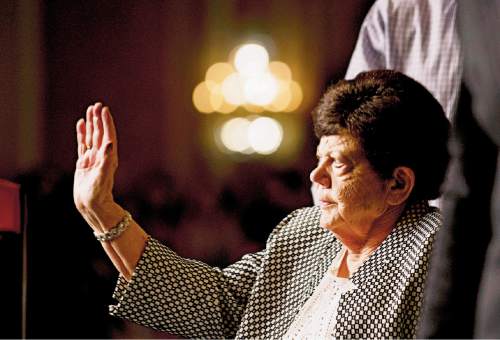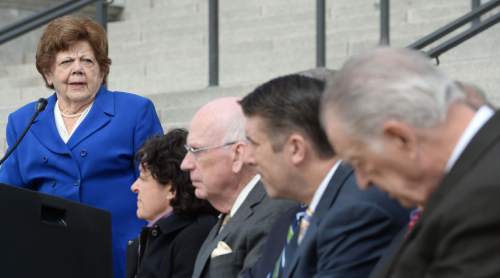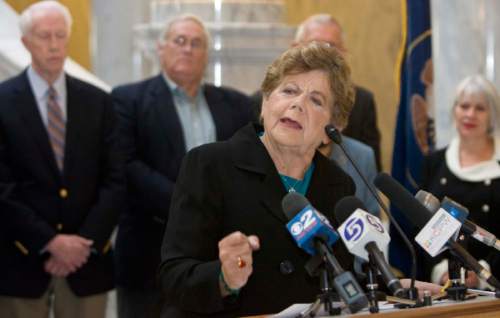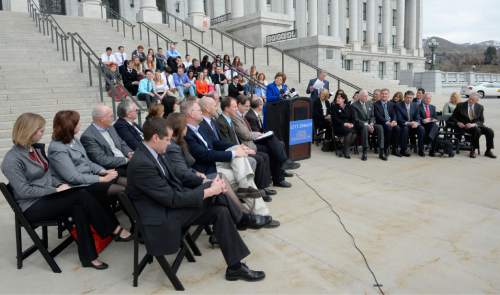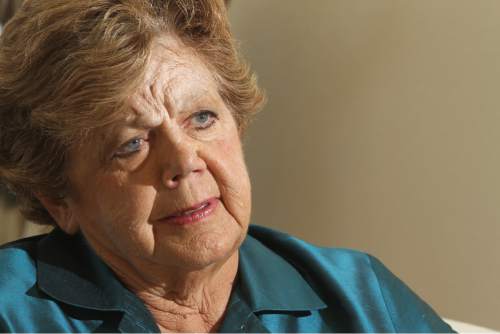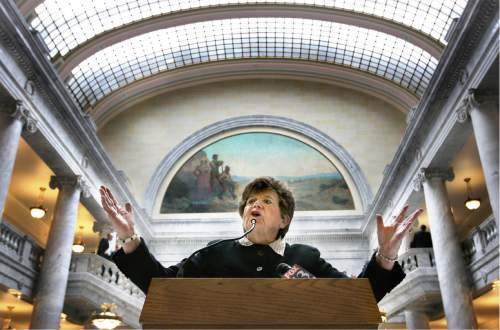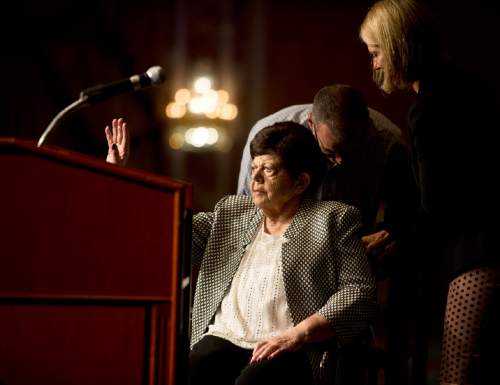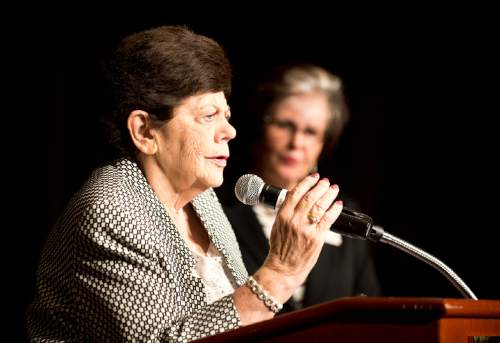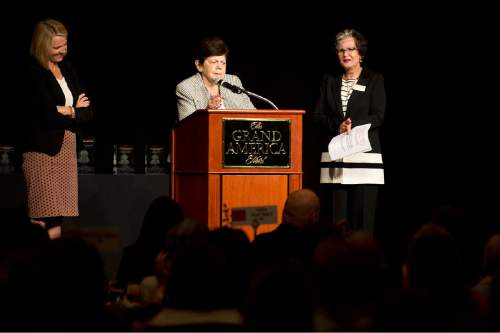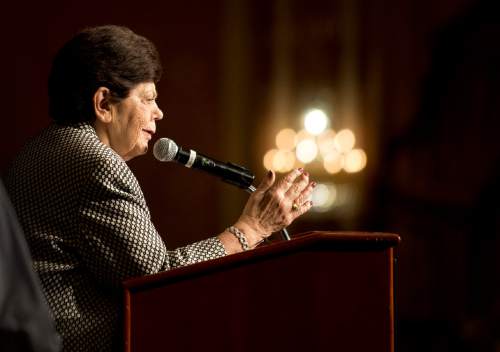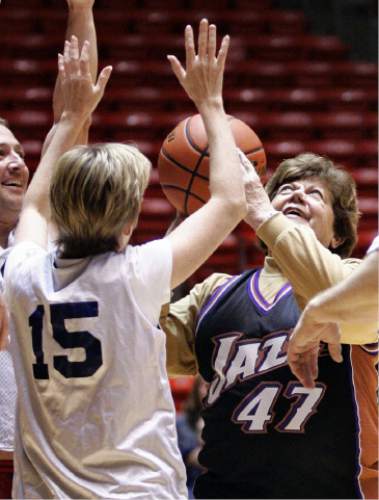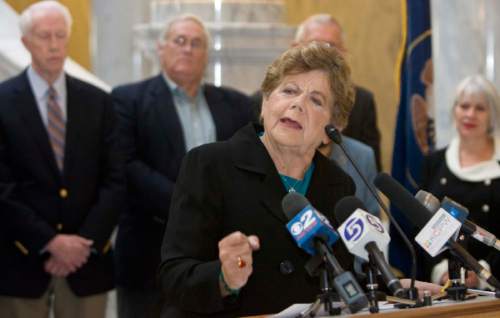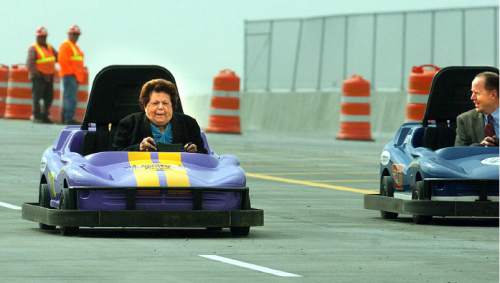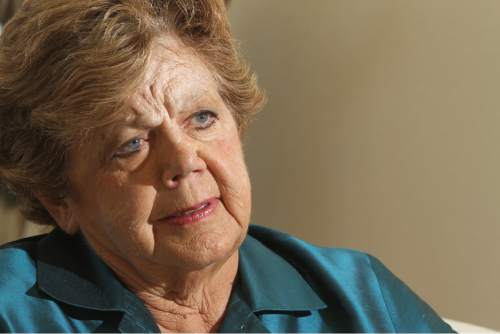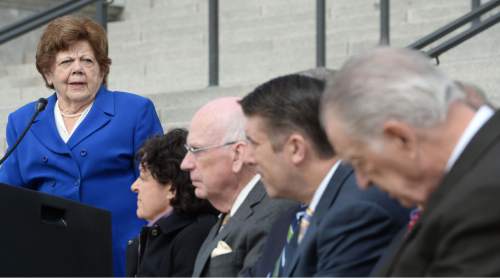This is an archived article that was published on sltrib.com in 2015, and information in the article may be outdated. It is provided only for personal research purposes and may not be reprinted.
Olene Walker, Utah's first and only female governor, leaves many namesake legacies — from an institute of politics and public service at Weber State University in her hometown of Ogden to a housing loan fund that has helped build affordable shelter for thousands of people with low incomes.
But when asked in a recent interview at the assisted-living center in Holladay where she spent the last months of her life, what it was she most wanted to be remembered for, her answer was characteristically simple, humble and practical.
"That I was kind and caring and somewhat intelligent. That I was willing to listen. And that I was not only willing to talk, but I was willing to do. That I worked my best to improve conditions for everyone in the state."
Walker died Saturday at age 85.
"We had a great week as a family together, and, in true Olene style, she surprised us and she's gone," said her daughter Nena Slighting. "Bless her heart."
Gov. Gary Herbert ordered U.S. and Utah flags at all state buildings flown at half-staff through Thursday.
"On behalf of all Utahns, we express our gratitude for the sacrifice and leadership of one of Utah's finest public servants," Herbert said in a statement.
Walker, Utah's 15th governor, was the second former chief executive to die this year. Two-term former Gov. Norm Bangerter died in April.
Those two deaths, along with that of former three-term Gov. Cal Rampton in 2007, leave just two former Utah governors alive: Mike Leavitt and Jon Huntsman.
Walker struggled to get the words out in September when asked the question about her legacy, just days before accepting the YWCA of Utah's Lifetime Achievement Award. She was fighting back from a respiratory disease that had put her on oxygen — at the same time pushing through the debilitating effects of two major strokes that occurred in 2014, and which many thought would be the end for her.
But, as she proved so many times in her life, people underestimated her fortitude.
"She is one tough lady," said former House Speaker Nolan Karras, long a political ally and close friend.
That inner toughness in an affable, gentle-mannered woman who liked to greet people with hugs and loved to laugh (often at herself) was part of the persona that prompted some in the rough-and-tumble world of politics to refer to her, dismissively (though never to her face), as "Aunt Bee." The reference to the kind but somewhat befuddled matriarch from Mayberry in the "Andy Griffith Show" also was helped along by the aura of discombobulation that Walker sometimes emitted.
Karras pointed to her habit of losing her purse several times a day or, more than once, opening a desk drawer to discover a check she had forgotten to deposit.
"She kind of gave you this impression of a sweet lady that was sort of disorganized, and then you just watched her clean the clock of people who took her for granted."
—
Disarming • Former Gov. Leavitt, who recruited her as his running mate in a hard-fought election campaign in 1992, called her manner "disarming." And he said it often proved effective in working through the thorniest skirmishes on Capitol Hill.
"When the legislative process was breaking down on a bill, I often asked Olene to walk upstairs to the Legislature and see what she could do. Inevitably, when she came back, the problem was solved."
Her persona also was a lot of fun, Leavitt recalls, and she got as much a kick out of it as anyone.
"Olene is real and often endeared herself to others by poking fun at herself," Leavitt said. "I remember one morning in a staff meeting, she had us in stitches as she laughingly told us about the new time-saving technique she had adopted in the morning by sticking her head out the window of the car to dry her hair."
When, in 2003, Leavitt called his partner of 11 years into his inner office and informed her that he was leaving midterm to take a position in the President George W. Bush administration, "I told her how proud I felt that she would become Utah's first female governor."
They ended this momentous chat with a hug, and she said simply, "I'll be ready."
"We both knew that was true," Leavitt said.
Walker was sworn in Nov. 5, 2003, and served with distinction for the next 14 months.
—
Achievements • Among her most memorable accomplishments in that short period — the briefest tenure of any governor since statehood — was the establishment of an early reading initiative in schools that was approved only after a dramatic showdown with legislative leaders, all of them men.
She threatened a budget veto if they didn't come through with money for the program.
Had they not caved and agreed to funding half the initiative with state dollars and half through local funds, she said she would have used the veto — no question.
"When I told them, I meant it. And they knew it, so it was their choice," she said in a recent interview.
They caved.
Walker then won the plaudits of the education establishment and the wrath of conservative reformers by vetoing the so-called Carson Smith Special Needs Scholarship program — the state's first limited private-school voucher initiative. She said she rejected the measure because of constitutional concerns over using public school money for private education.
She conceded recently that it was probably the biggest political mistake of her career — she won the enmity of Republican delegates despite her sky-high popularity with the public at large. But she also said she would have done it again because it was the right thing to do.
As throughout her private and political life, education was her top issue.
In 1986, at age 55, the daughter of a classroom teacher and a school superintendent was awarded her doctorate in education administration from the University of Utah. The same day, her son graduated from medical school, while her youngest daughter, a daughter-in-law and a son-in-law all graduated from college.
For Walker, it was the culmination of years of sleep deprivation, writing her dissertation from 11 p.m. to 3 a.m. after a full day of helping run the family snack-food business and serving in the Utah House. This was after raising seven children with her husband, Myron.
"She always told us that if someone had a good education and an opportunity for a good education, then it would change the rest of their lives," said Slighting, her daughter.
—
Education • Walker, the state's only Ph.D. governor, saw education's value as not coming solely from the accumulation of knowledge or improving one's career prospects, but also from a sort of psychic healing it can provide.
Education, she said, empowers people "to feel good about themselves and their school and their community and their country. It gives people self-esteem, as well as helps their ego to be able to accomplish something on their own."
Her devotion to using political power to improve Utah's education system was what drove her in 1991 to abandon a promising congressional campaign and accept Leavitt's invitation to be his running mate.
"The sole basis for her decision was she felt ultimately she could do more for education in the state" from the Utah Capitol rather than from Congress, said longtime protege Camille Anthony. "That really was her passion across the board — education."
"That [switching campaigns] was one of my first memories of her, just watching someone make a decision, a hard decision, to evaluate it and ultimately make a decision for the right reasons. It wasn't, 'Gosh, what's going to be the best for my career? What pays the most?' It wasn't based on any of those things. It truly, honestly was, 'Where can I have the biggest impact on education for the kids in the state of Utah?' "
Anthony says it proved to be exactly the right call. For the next 12 years, the Leavitt-Walker administration focused on education, and the lieutenant governor launched a tireless campaign promoting reading.
Reading to kids became Walker's trademark — from her constant refrain urging parents to read to their kids at least 20 minutes a day to her own serial read-alouds: visiting schools to read to kids in classrooms, corralling Boy Scouts touring the Capitol to read to them, reading to the nieces and nephews of staffers in the governor's office. Always a book open in her hand, reading.
—
'Oh, the Places You'll Go' • Meghan Holbrook, a friend and former neighbor of Walker, recalls her employer, Zions Bank, donating crates of Dr. Seuss books to use in the then-governor's reading initiative and attending one of her classroom forays.
"One of her favorites was '[Oh,] the Places You'll Go,' " Holbrook recalls. "She sat down with the kids on one of these tiny little chairs and she read this Dr. Seuss book. And one of the little kids said, 'Well, where are you going to go?' And she said, 'I'm the governor.' And he said, 'Are you going to do anything else?' And she laughed."
Another thing Holbrook, a lifelong Democrat, remembers about her Republican pal was her rare ability to listen to people and hear what they were saying.
"You just don't see that anymore," Holbrook said.
In so many meetings and conversations involving politicians, it's all about getting your licks in or scoring points, she said. People are not actually talking to one another.
"But Olene could sit back and she'd put her hands on her stomach and kind of lean back, you know how she'd cock her head back, and she'd listen."
Anthony concurs this was among the best of her mentor's many good qualities.
"She still has that — such a personal touch with just regular people. It doesn't matter who it is, she's willing to have a conversation and use her time and is genuinely interested."
Anthony said recently an acquaintance relayed a story of a woman looking for an assisted-living center for a friend. They happened to visit the one where Walker was residing, in a wheelchair, with an ever-present oxygen tank and stroke-induced partial paralysis.
"Even in the condition that she was in, this woman said she was so charming," Anthony said.
"She said, 'She came up to me and said, I'm Olene. Tell me about you.' "


